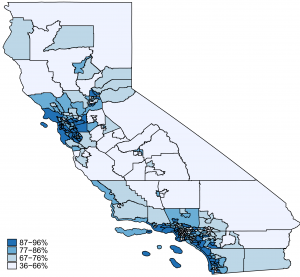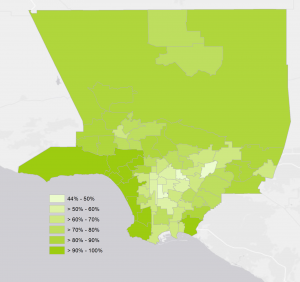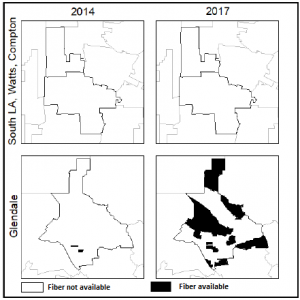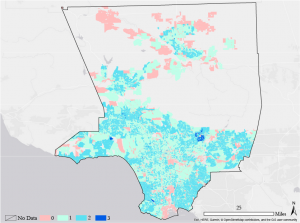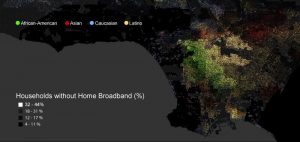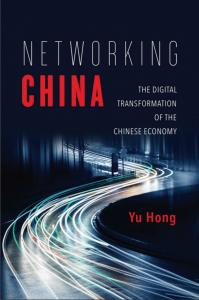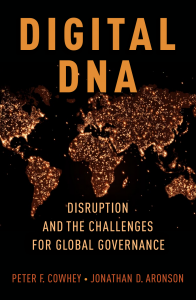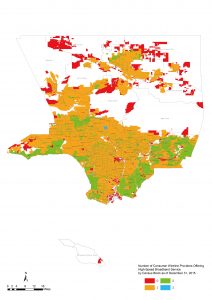Publications
This Connected Communities and Inclusive Growth (CCIG) report that examines the ability of K-12 students in California to engage in distance learning based on the availability of an internet-connected computer at home. Among the key report findings are: One in four K-12 households in California do not have a desktop or laptop computer…
COVID-19 and the Distance Learning Gap
Authors: Hernan Galperin, Kurt Wyatt, Thai Le
As schools across the country transition to distance learning due to the COVID-19 crisis, a new CCIG report documents the extent of the distance learning gap in Los Angeles County. The distance learning gap refers to the gap between students living in households with high-speed Internet and a desktop or laptop computer, and those without…
Who Gets Access to Fast Broadband? Evidence from Los Angeles County 2014-17
Authors: Hernan Galperin, Thai Le, Kurt Daum
Abstract: As consolidation in the US residential broadband market continues, there is concern that that Internet Service Providers (ISPs) are “cherry-picking” areas for upgrades to fast broadband services. This policy brief examines this question for Los Angeles (LA) County during the 2014-17 period. In particular, it probes for evidence that ISPs are neglecting investments in low-income…
Galperin, H., & Greppi, C. (2019). Geographic Discrimination in the Gig Economy. In Graham, M. (ed.), Digital Economies at Global Margins. Cambridge: MIT Press. Abstract: Online labor platforms were expected to flatten labor markets by reducing the importance of worker location and, as a result, promote employment and wage growth in developing countries based on…
This policy brief analyzes trends in residential broadband coverage and competition in LA county. It is based on information about Internet availability and service speeds at the census block level collected by the California Public Utilities Commission (CPUC) for 2015-2016 (the most recent available). This information is combined with data from the American Community Survey…
Mapping digital exclusion in Los Angeles County
Authors: Hernan Galperin, François Bar, Annette Kim
This policy brief maps the social and geographical contours of digital exclusion in Los Angeles County. The focus is on home broadband, which refers to the adoption of residential Internet services, regardless of access technology or devices used. The data is sourced from the 2015 American Community Survey (ACS), which is the latest available that allows…
Networking China: The Digital Transformation of the Chinese Economy
Authors: Yu Hong
Networking China: The Digital Transformation of the Chinese Economy (Geopolitics of Information) (2017, Univeristy of Illinois Press) by Yu Hong In recent years, China ‘s leaders have taken decisive action to transform information, communications, and technology (ICT) into the nation’s next pillar industry. In Networking China , Yu Hong offers an overdue examination of that burgeoning…
Digital DNA: Disruption and the Challenges for Global Governance
Authors: Jonathan Aronson (with Peter Cowhey)
Digital DNA: Disruption and the Challenges for Global Governance (forthcoming, Oxford University Press) by Jonathan Aronson (with Peter Cowhey) Innovation is an important, long-term sustainable source of economic prosperity. Digital DNA identifies how digital information and production technologies, the Information and Production Disruptions, are transforming how companies and national economies are innovating. Wisely guiding this transformation in innovation…
Home Broadband in Los Angeles County
Authors: Hernan Galperin, François Bar, Annette Kim
The Connected Cities and Inclusive Growth (CCIG) project seeks to map inequities in broadband infrastructure and digital skills in greater Los Angeles, and explore their socio-economic determinants and consequences. This policy brief is the first project publications, and reports findings on the availability and competition in residential broadband services in Los Angeles County at the block level. The…
Automation, Algorithms, and Politics | When Bots Tweet by Nathalie Marechal
Authors: Nathalie Marechal
Political actors are using algorithms and automation to sway public opinion, notably through the use of “bot” accounts on social networking sites. This article considers the responsibility of social networking sites and other platforms to respect human rights, such as freedom of expression and privacy. It then proposes a set of standards for chat bots operating on these platforms, building on the existing policies of leading social networking platforms and on the indicators laid out by Ranking Digital Rights. A good normative framework for the use of bots on social networking sites should have three components: bots should clearly be labeled as such, they should not contact other users without consent, and information collected by them should only be used for disclosed purposes.
- « Previous
- 1
- 2
- 3
- 4
- Next »
